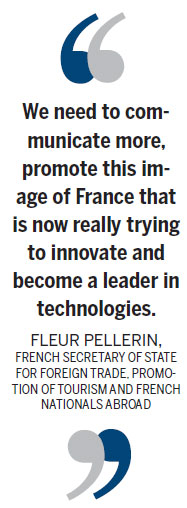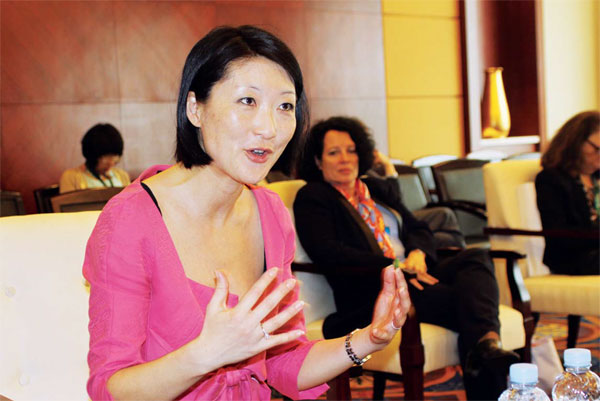France courts Chinese investors
Updated: 2014-05-02 07:50
By Chen Yingqun and Cai Muyuan (China Daily Europe)
|
|||||||||||
|
Fleur Pellerin says China and France are trying to implement a growth model based on innovation and sustainable development. Cai Muyuan / China Daily |
Top foreign trade official vows to do more to attract Chinese investment
Days after she took office recently, France's top foreign trade official decided that the first country she would visit would be China. And to further underline that she means business, Fleur Pellerin, the secretary of state for foreign trade, promotion of tourism and French nationals abroad, has vowed to do more to attract Chinese investment, tourists and students to her country.
Pellerin, who was born in the South Korean capital, Seoul, in 1973, is the first person of Asian descent to become a French cabinet minister.
China's direct investment in France is a quarter the size of French investment in China, and one of her main goals is to narrow that gap, she says. Trade between France and China was worth 55.3 billion euros, and France's exports to China accounted for 14.7 billion euros.
"France is very open to investment. We have been rolling out very ambitious policies to attract more direct investment in the country, such as the key issues of giving more flexibility to the labor market, trying to stabilize the fiscal and regulatory environment for foreign investors and improving visa and work permits for foreigners."
A lot of trade between France and China is based on high-value technology industries such as aerospace, energy and electronics, Pellerin says, but there are also opportunities in other areas where innovation is important.
"The first is the green economy," she said during the Green Companies Summit that was held recently in Nanning, in the Guangxi Zhuang autonomous region. The summit was organized by the China Entrepreneur Club, which consists of 46 leaders of the country's top private companies. Green growth and green energy were key topics at the summit.
Pellerin says she was at the summit mainly to lend support to a delegation representing a dozen French companies active in the green economy, some of them already in China and others eager to create partnerships or find new markets.
"It is a big challenge for us in Europe and also in China to find a new sustainable growth model, so I think there's a big future of in the green economy. We already have partnerships between Chinese and French cities to develop eco-districts, so places and districts in cities will experiment with this kind of technology."
The food industry is another area where she is looking for more collaboration. In Beijing after the summit she signed agreements with the General Administration of Quality Supervision, Inspection and Quarantine of China on ensuring the authenticity of French wine imports.
There will be more collaboration between the two countries on trade in foodstuffs, including meat, she says.
Another important sector is health. e-health, in particular, where new technology plays a key role, she says.
Pellerin says China and France have a lot in common: both have long and rich histories and culture, and both are trying to implement a growth model based on innovation and sustainable development. The two hold each other in high regard and need to build on that to develop political and economic ties, she says.
Many Chinese go to France because of its history, traditions, way of life, and perhaps its food, wine and fashion, she says, and the country should continue to develop its image based on those aspects.
But in China she was eager to let her Chinese counterparts know that one of the cornerstones of France's economy, and one that is becoming more important, is startups and new technologies.

"But we need to communicate more, promote this image of France that is now really trying to innovate and become a leader in technologies."
Many Chinese identify France with luxury brands, but they account for only about a 10th of its exports to China, she says. The true opportunities for the two countries to work together lie in small and medium-sized companies, the most vital part of France's economy, she says.
"For example, in cloud computing and big data, French small and medium-sized enterprises and French startups are very competitive."
Because the two countries face common challenges with technology, French companies could share their expertise with Chinese SMEs, she says. However, the French SMEs, of which there are many, remain small and it is difficult to help them grow, she says, one reason being a shortage of venture capital or development funds.
"So I've been working on financing issues for the past two years."
Given the size of Alibaba, the Chinese e-commerce giant that is listing soon, the French companies could do worse than to emulate its business model in their efforts to grow, she says.
"And more generally, even if the markets in Europe and in China are very different, it would be profitable for French companies to see how Chinese companies deal with a big market and what strategies it uses."
Another problem for the SMEs is promoting them overseas, and she has made that one of her missions with French technology companies and startups.
In thinking of technology, most people think of Silicon Valley in California or of China, Israel, Japan and South Korea, she says, and France is yet again hobbled by its stereotype as a purveyor of luxury goods.
"I want to change that image, because we have a great technology eco-system and great e-commerce companies."
During Pellerin's visit, her first to China, she met many people in the tourism industry, the aim being to attract more Chinese to France. Last year, 1.5 million Chinese visited the country, she says.
"So definitely we need to work on the way we welcome them and on infrastructure."
In late January visa procedures for Chinese wanting to visit France were eased, making it possible for tourist and business visas to be obtained within 48 hours, Pellerin says.
The result has been spectacular, the number of visas issued to Chinese people rising 40 percent over three months.
Last year, the number of hotel bookings in France by the Chinese rose 40 percent, and about 40 percent of French hotel bookings were by Chinese, she says.
"Tourists are very important, because they take back the image of the country and they can help us promote the image of France in China."
Pellerin says France also wants to attract more Chinese students, 30,000 of whom are in the country at the moment, which makes Chinese the largest foreign presence in the country's universities, she says.
"Today we have 10 times the number of Chinese students of 10 years ago, so growth is very strong."
During her trip, she also visited the French International School in Beijing.
Pellerin, who was adopted by a French family when she was six months old, was raised near Paris. Her Asian face creates a link wherever she goes in Asia, even before a word is spoken, she says. When she was appointed a minister in 2012 it was widely welcomed, and she regards her being part of the government as "symbolic and very important for Asian-born people in France".
It probably sends a signal of openness of French society and political leaders, and it is also very positive for the country's image abroad, she says.
Contact the writers through chenyingqun@chinadaily.com.cn
(China Daily European Weekly 05/02/2014 page22)
Today's Top News
Swiss move to reveal bank accounts will help China
Chinese police to patrol in Paris
Beijing rebuffs Hanoi's oil rig claims
Key Sino-Nigerian deals signed
EU: No armed intervention in Ukraine
Chinese premier visits Nigeria
Court to rule on Yingluck in Thailand
Travellers to Malaysia drop
Hot Topics
Lunar probe , China growth forecasts, Emission rules get tougher, China seen through 'colored lens', International board,
Editor's Picks

|

|

|

|

|

|






